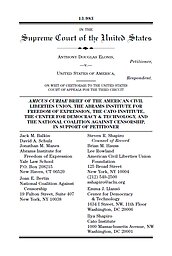Learn more about Cato’s Amicus Briefs Program.
To ensure that public discussion remains “uninhibited, robust, and wide-open,” the First Amendment protects speech that is “vituperative, abusive, and inexact.” While nobody will argue that Anthony Elonis’s speech—the subject of a Supreme Court case this coming term—was anything but “vituperative, abusive, and inexact,” there is considerable disagreement over whether his speech should be protected by the First Amendment. Elonis’s chosen form of speech was a series of rap lyrics he posted on Facebook under the pseudonym “Tone Dougie.” Many of the lyrics were violent and lurid, and some of these violent images were made in reference to Elonis’s estranged wife, who took them as a threat to her life. As a result of his crude posts, Elonis was fired, his wife obtained a protective order against him, and he was arrested and charged with violating 18 U.S.C. § 875(c), which makes it a federal crime to transmit in interstate commerce “any communication containing any threat to injure the person of another.” Elonis argued that his rap lyrics were an artistic expression and that since he did not intend them to be a threat, his speech should be protected. The federal district court hearing his case didn’t see it that way. The judge rejected his request that the jury be instructed to consider his actions based on whether he expressed a subjective intent to threaten and instead instructed the jury to judge his speech based on whether a reasonable person would have interpreted the lyrics as a serious expression of intent to inflict bodily injury. Elonis was thus convicted, and the U.S. Court of Appeals for the Third Circuit also rejected his argument that a subjective intent to threaten is required before speech loses First Amendment protection. Now before the Supreme Court, Cato has joined the ACLU, the Abrams Institute for Freedom of Expression at Yale School, and two other groups on a brief supporting Elonis’s position. We argue that Supreme Court precedent shows that (1) a subjective intent to threaten is an essential element of a “true threat,” (2) requiring a finding of subjective intent is in line with First Amendment principles, and (3) drawing the line between threat and protected speech carefully is particularly important given the rise of the internet as a forum of communication—one where it can be easy to take things out of context. As a matter of most people’s taste, the internet may well be better off without violent rap lyrics like Anthony Elonis’s. But that shouldn’t matter to this case or how it’s analyzed under the First Amendment, which requires a high standard of proof regarding incitement or threats of violence before individuals can be jailed for their speech. The Supreme Court should take this opportunity to speak that truth freely across all mediums.

This work is licensed under a Creative Commons Attribution-NonCommercial-ShareAlike 4.0 International License.
